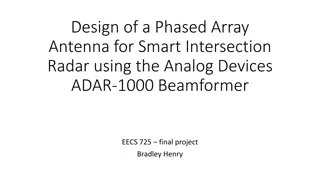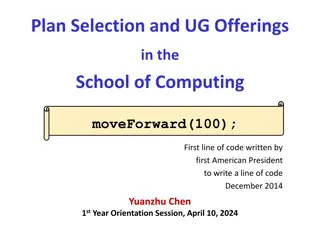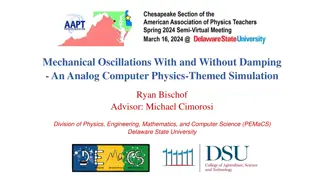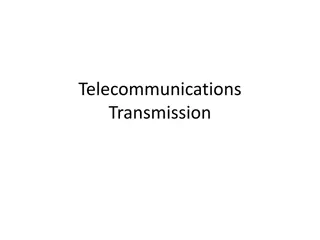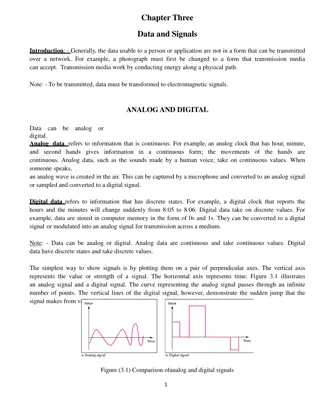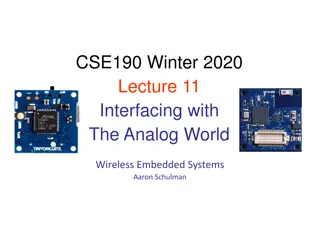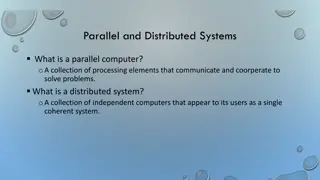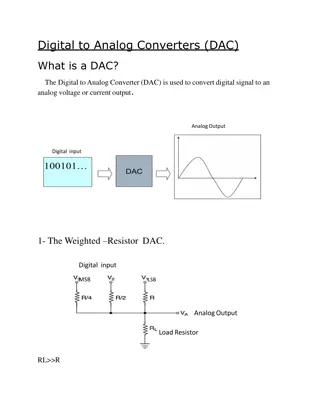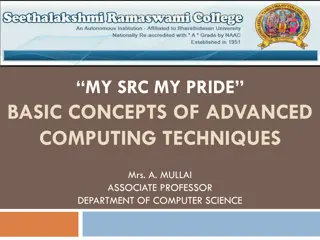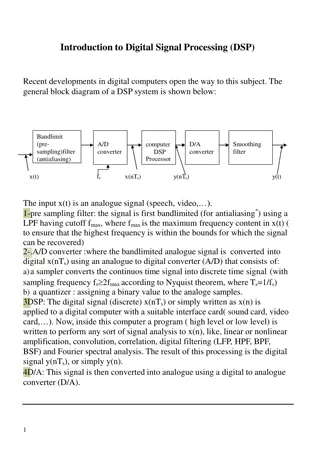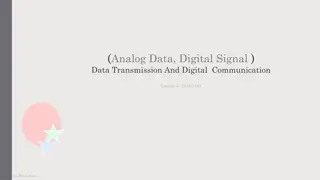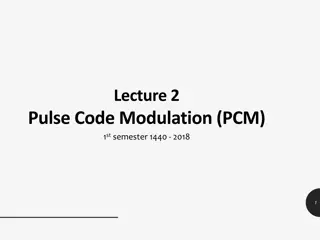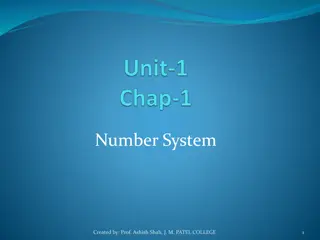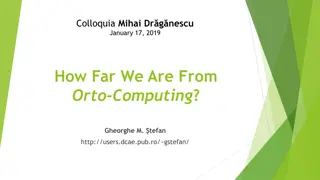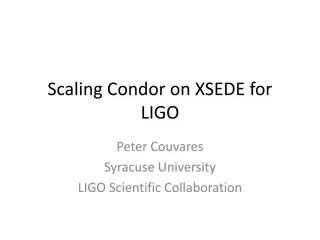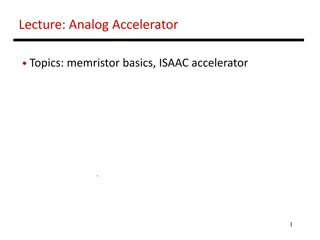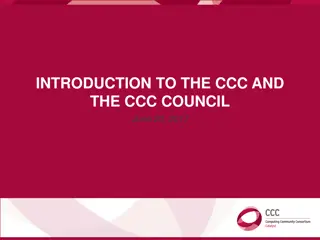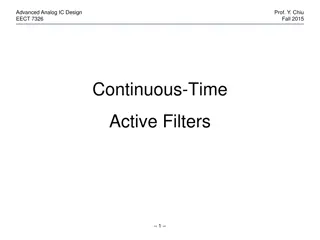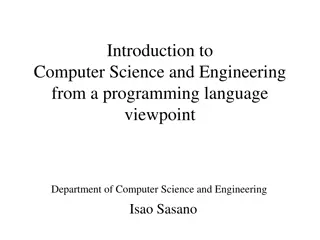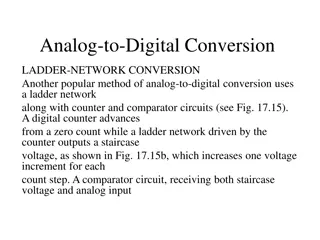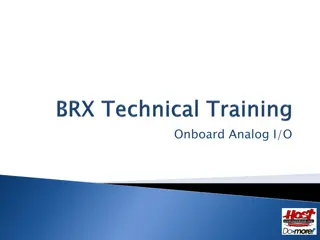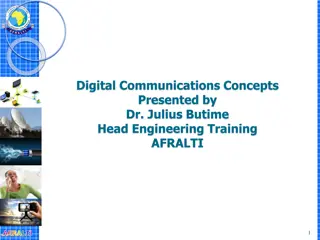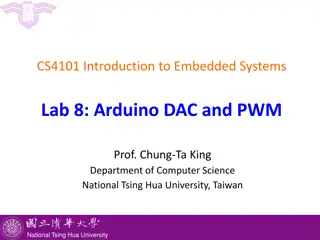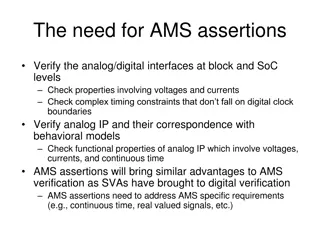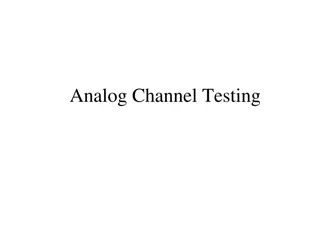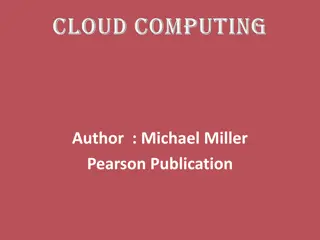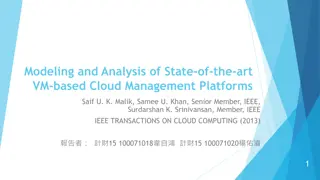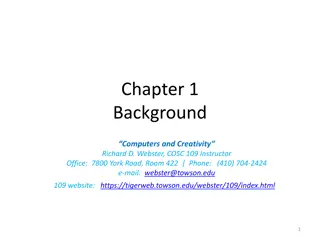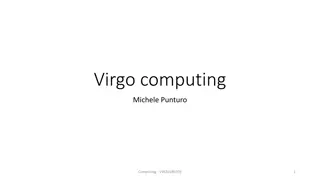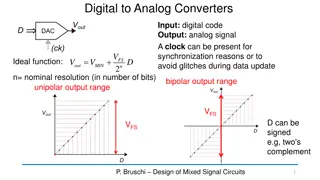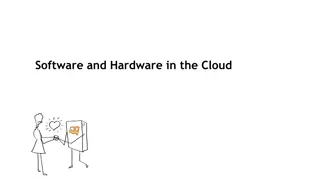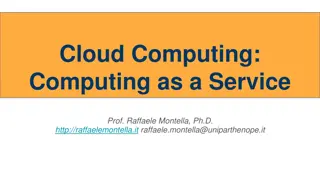ANALOG AND DIGITAL ELECTRONICS 21CS33
Explore the world of analog and digital electronics through the lens of registers, counters, and flip-flops. Dive deep into the operation of these components, learn how to transfer data between registers, build and analyze shift registers, construct timing diagrams, and understand binary counters. D
0 views • 112 slides
Phased Array Antenna Design for Smart Intersection Radar Using Analog Devices ADAR-1000
Designing a phased array antenna system for a smart intersection radar project utilizing the Analog Devices ADAR-1000 beamformer. The system involves 4 independent phased arrays covering key directions in the intersection, with considerations for beam steering, beamwidth, and array configuration. Ke
0 views • 9 slides
Possible Analog States of the Hoyle State in Heavier Nuclei
Research conducted at the National Research Centre, Kurchatov Institute, explores possible analogs of the Hoyle state in heavier 4N nuclei, focusing on the 7.65 MeV 0+2 state in 12C (Hoyle state). The study reveals insights into the structure and characteristics of the Hoyle state, crucial for under
0 views • 12 slides
Analog Circuits and Labs Lecture Schedule at IIT Bombay
Lecture schedule and course materials for EE204 Analog Circuits and EE230 Analog Labs delivered by Assistant Professor Sandip Mondal at IIT Bombay. The grading system, class note submission guidelines, attendance rules, and classroom discipline expectations are outlined for the course. Students are
4 views • 17 slides
Computing Degree Plans and Offerings at School of Computing
Explore the diverse degree plans and offerings at the School of Computing, including Honours and General degrees, minors, and certificates in Data Analytics. Plan selection is crucial for advancing to second-year courses, with automatic acceptance and pending list options available. Discover the var
1 views • 20 slides
Analog Computer Simulation of Mechanical Oscillations with Damping
Explore the analog computer simulation of mechanical oscillations with and without damping in a physics-themed project. Students can visualize classical physics concepts through hands-on analog circuit design, modeling spring-mass systems and RLC circuits. The project involves constructing a breadbo
0 views • 11 slides
Telecommunications Transmission Systems
Transmission systems in telecommunications provide circuits between network nodes using channels for bidirectional communication. Channels can range from simple audio circuits to complex satellite systems. Signals can be analog or digital, each with its unique characteristics. Bandwidth is crucial f
0 views • 32 slides
Data and Signals in Networks
Data transmission involves converting information into electromagnetic signals for communication. Analog data is continuous, like a clock's hands, while digital data is discrete, like binary code in computer memory. Signals can be analog or digital, periodic or non-periodic, with characteristics lik
0 views • 17 slides
Interfacing with Analog Signals in Embedded Systems
Exploring the conversion of analog signals from the physical world into electrical signals using transducers in embedded systems. Learn about going from analog to digital representation, choosing sample rates, the Shannon-Nyquist sampling theorem, importance of anti-aliasing filters, and the necessi
0 views • 18 slides
Parallel and Distributed Computing Systems
In parallel computing, processing elements collaborate to solve problems, while distributed systems appear as a single coherent system to users, made up of independent computers. Contemporary computing systems like mobile devices, IoT devices, and high-end gaming computers incorporate parallel and d
2 views • 11 slides
Digital to Analog Converters (DAC) and Their Applications
Digital to Analog Converters (DAC) are essential components used to convert digital signals into analog voltage or current outputs. This article explains the working principle of DACs, provides examples of different types such as Weighted Resistor DAC, R-2R Ladder DAC, Feedback Amplifier DAC, and Si
0 views • 9 slides
Basic Concepts of Advanced Computing Techniques
Delve into the world of advanced computing techniques with Mrs. A. Mullai as she discusses networks, computing, and pervasive (ubiquitous) computing. Discover how networks facilitate data exchange, the role of computing in designing hardware and software systems, and the trend of embedding computati
2 views • 40 slides
Overview of Digital Signal Processing (DSP) Systems and Implementations
Recent advancements in digital computers have paved the way for Digital Signal Processing (DSP). The DSP system involves bandlimiting, A/D conversion, DSP processing, D/A conversion, and smoothing filtering. This system enables the conversion of analog signals to digital, processing using digital co
1 views • 24 slides
Cloud Computing, Edge Computing, and Their Applications
Cloud computing entails centralized processing of data on powerful servers, offering scalable resources over the internet. Edge computing brings processing closer to data generation points, reducing latency and enhancing security. Both paradigms cater to different needs such as IoT, autonomous vehic
0 views • 18 slides
Analog Data and Digital Signal Transmission
This lecture delves into the concepts of analog data, digital signals, and the processes involved in data transmission and digital communication. It covers topics such as Pulse Amplitude Modulation (PAM), Analog-to-Digital Conversion, and Sampling. The conversion of analog signals to digital signals
0 views • 34 slides
Pulse Code Modulation (PCM) in Analog to Digital Conversion
This content delves into the realm of Pulse Code Modulation (PCM), outlining its significance in converting analog data to digital signals. It covers the process of Analog to Digital Conversion, emphasizing the advantages of digitizing analog signals for improved quality and reduced noise. The steps
0 views • 14 slides
Analog and Digital Systems in Telecommunications
Analog systems involve altering a base carrier's frequency to encode information, while digital systems represent data as strings of 0s and 1s. Prof. Ashish Shah explains the concepts in a clear and informative manner, highlighting the differences between analog and digital technologies in telecommu
0 views • 33 slides
Orto-Computing: Bridging the Gap Between Formal and Phenomenological Computing
Meaningful experiments suggest a transition from the formal, Turing-based approach to a structural-phenomenological one called Orto-Computing. This innovative concept integrates mind-matter interaction and non-formal functions within computational systems, offering potential solutions to complexity
0 views • 18 slides
Scaling Condor on XSEDE for LIGO - Collaborative Computing Project
The project aims to evaluate the utilization of XSEDE resources by LIGO for large-scale computing tasks, with a focus on distributed computing challenges and fostering a research computing community. Various aspects such as political, cultural, and technical narratives surrounding the collaboration
0 views • 28 slides
Analog Accelerator: Memristor Basics and ISAAC Accelerator
Explore the world of analog acceleration with topics covering memristor basics and the ISAAC accelerator. From understanding noisy analog phenomena to leveraging wires as ALUs, delve into crossbars for vector-matrix multiplication and the challenges of high ADC/DAC area/energy. Discover solutions li
0 views • 23 slides
Overview of the Computing Community Consortium
The Computing Community Consortium (CCC) was established in 2006 under the Computing Research Association (CRA) to develop a vision for computing research and communicate it to stakeholders. It aims to align computing research with national priorities, encourage high-impact research, and groom new l
0 views • 48 slides
Introduction to Mobile Computing Principles and Designing Mobile Applications
Mobile computing systems involve computing capabilities that can be utilized while on the move, leveraging wireless connectivity, small size, and mobile-specific functionalities. The history of mobile computing traces back to military origins and has evolved with technologies like GPS and wireless t
0 views • 98 slides
Introduction to Boston University's Shared Computing Cluster
Boston University's Shared Computing Cluster (SCC) provides researchers with access to a high-performance computing environment for running code, collaborating on shared data, and utilizing specialized software packages. With over 800 nodes, 20,000 processors, and hundreds of GPUs, the SCC offers re
0 views • 63 slides
Overview of Task Computing in Parallel and Distributed Systems
Task computing in parallel and distributed systems involves organizing applications into a collection of tasks that can be executed in a remote environment. Tasks are individual units of code that produce output files and may require input files for execution. Middleware operations coordinate task e
0 views • 17 slides
Advanced Analog IC Design and Filtering Techniques
Exploring the world of Advanced Analog IC Design through the concepts of continuous-time active filters, frequency domains, time domains, filter specifications, and examples of passive RLC filters. Delve into the intricacies of different filter types, such as low-pass, high-pass, and band-pass, to e
1 views • 60 slides
Overview of Communication Systems: Signal vs. Noise
Communication systems involve a battle between signal and noise/distortion, with information represented in analog or digital form. Analog signals include speech, music, and temperature readings, while digital signals can represent text and computer data. The history of analog and digital messages,
0 views • 17 slides
Overview of Computer Science: From Analog to Digital Computing
Explore the evolution of computing from analog devices like sundials and slide rules to mechanical digital computers by Charles Babbage, and the groundbreaking ENIAC - the first general-purpose digital computer. Delve into the concept of encoding information in digital computers using binary numbers
0 views • 42 slides
Analog-to-Digital Conversion Using Ladder Network
Another popular method of analog-to-digital conversion involves the use of a ladder network in conjunction with counter and comparator circuits. In this method, a digital counter progresses from zero while the ladder network driven by the counter generates a staircase voltage pattern, incrementing b
0 views • 6 slides
Advanced Configurable Analog I/O Modules for Automation Systems
Explore a range of onboard analog I/O modules including BX10, BX18, and BX36 series, each offering high-speed discrete inputs and outputs along with analog input and output options. These modules are fully configurable with flexible voltage and current ranges. Additionally, learn about the new memor
0 views • 7 slides
Analog and Digital Communications Concepts
Exploring the differences between analogue and digital signals, this content presents a comprehensive overview. It covers the definitions of analog, the prevalence of analog signals in our surroundings, and the advantages of digital communication such as error correction, encryption, and data proces
0 views • 13 slides
Introduction to Arduino DAC and PWM in Embedded Systems Lab
Explore the practical application of Arduino's digital-to-analog converter (DAC) and pulse width modulation (PWM) techniques through projects involving RGB LED modules, analog joysticks, and stepper motors. Learn to control RGB LED colors, read analog joystick input values, and operate stepper motor
0 views • 10 slides
Advancing AMS Assertions for Analog/Digital Interface Verification
AMS assertions play a crucial role in verifying analog/digital interfaces, checking properties related to voltages, currents, and complex timing constraints. They bring advantages similar to SVAs in digital verification, addressing specific AMS requirements. Examples showcase comparisons of voltage/
0 views • 11 slides
Overview of Analog Channel Testing and Parametric Analysis
Explore the world of analog channel testing, types of analog channels, AC parametric tests, gain and level testing, and more. Understand the components involved, critical measurements like absolute voltage levels, and ways to detect circuit defects efficiently. Dive into the nuances of AC circuit pe
0 views • 60 slides
Introduction to Cloud Computing: A Comprehensive Overview
Cloud computing, a transformative technology, enables easy access to applications and data from anywhere in the world, promoting collaboration and efficiency. This chapter delves into the fundamentals of cloud computing, distinguishing it from traditional desktop computing and network computing. Und
0 views • 32 slides
State-of-the-art Analysis of VM-based Cloud Management Platforms
This study delves into the modeling and analysis of cutting-edge VM-based cloud management platforms, exploring topics such as cloud computing, cloud structure, types of cloud computing, key features of cloud computing, and examples from the cloud computing industry. It discusses Infrastructure as a
0 views • 40 slides
Digital and Analog Information in Computers
Explore the concepts of digital and analog information in computers through examples like thermometers, sound, and sight. Learn how computers process discrete digital data compared to continuous analog information, and why understanding both is essential in digital media courses. Delve into the conv
0 views • 49 slides
Overview of Virgo Computing Activities
Virgo computing has been a hot topic recently, with various discussions and meetings focusing on computing issues, future developments in astroparticle computing, and funding for INFN experiments. The activities include presentations, committee meetings, talks, and challenges in computing faced by V
0 views • 34 slides
Digital to Analog Converters
Digital-to-Analog Converters (DACs) play a crucial role in converting digital data to analog signals. Explore DAC applications, performance parameters, potential errors like quantization error and non-linearity, and DAC architectures such as R-2-R ladder and Switched Capacitors. Understand the impor
0 views • 26 slides
Software and Hardware in the Cloud: Benefits and Risks
Impact of Software as a Service (SaaS) and hardware clouds in the cloud computing landscape. Learn about the cost-saving benefits for firms, revenue models for SaaS vendors, and risks associated with SaaS adoption. Distinguish between SaaS and hardware clouds, understand cloud computing concepts, an
0 views • 22 slides
Cloud Computing: Computing as a Service
Delve into the world of cloud computing and the concept of computing as a service through topics like virtualization, advanced services, serverless computing, and more. Explore the benefits of instant deployable computing power, scalability, and pay-as-you-go models. Uncover the workings of virtuali
0 views • 28 slides

